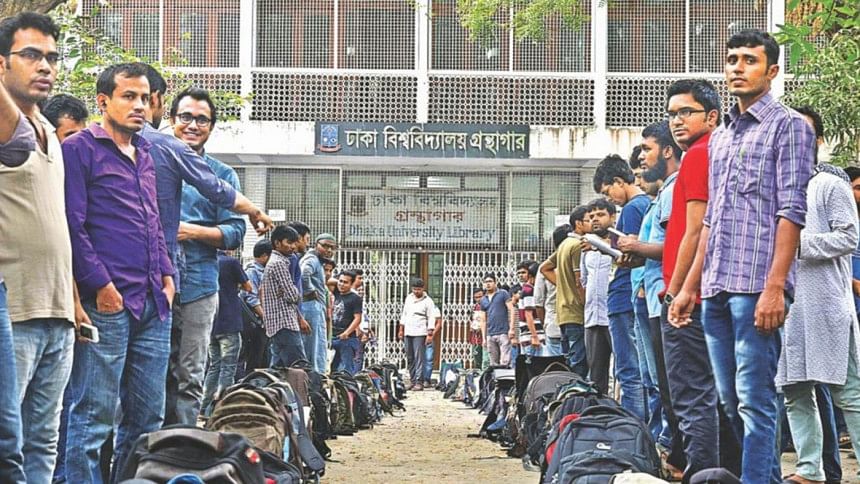Young people can change the system, but they need better guidance

"Won't you change your birth year?" my class teacher had asked with a confused look. She was processing the paperwork for changed birth years in our class nine cohort, and amidst all the "new" 1992s and 1993s, I was one of the two "original" 1991s left. "No, my parents said it's alright not to change it," I remember telling her. She looked perplexed, as if she was seeing my future flash before her eyes and wondering how my parents could knowingly do me so much harm. After all, I would not have an extra shot at BCS exams because of their choice.
Changing birth years to reduce age is probably one of the most common memories we Bangladeshis share. The aim of this practice is to get extra years to sit for the Bangladesh Civil Service (BCS) examination which one cannot apply for after the age of thirty. From the young age of class nine, we learn to accept that changing something as fundamental as the year we're born in is alright as long as it gives us better opportunities to run the rat race and ace the exams that are often tied to glory and respect.
Now, we've reached a point where public university exams are being scheduled according to BCS exam dates. The aim of university education, unfortunately, seems to revolve around getting a degree to qualify for participating in the BCS exam. In the process, we're gradually drifting towards making university education more and more redundant. Who can blame the students for wanting to focus more on their BCS studies than on their education? Who can blame the teachers for not being able to entice students away from BCS, and towards other routes such as research, development and academia? Nobody can blame either of the groups. It is the system that is at fault here.
There are several sides to this system failure. Firstly, BCS has very few alternatives that are equitable to all. Many factors are at play here, including corruption and connections. There are vast differences in terms of access and opportunity among the candidates who come from different socioeconomic backgrounds, from both rural and urban areas. Over the years, thanks to the initiatives of some strong leaders, the BCS exams have managed to gain some credibility by being less prone to corruption. This makes it somewhat more equitable to all in terms of entry. Secondly, acing the BCS exams is gradually becoming an overarching goal for more and more students because it has been made more lucrative, not just in terms of monetary benefits and facilities, but also in terms of social status and dignity. Lastly, and perhaps most pathetically, it is regarded as one of the most valued achievements in our society, so much so that one's self-worth, marriage prospect, and parental pride all seem to depend on one's success in BCS exams. Before we lose the entire population of students to this farce of a success, we must take a pause to think, at what cost is this success coming?
It's coming at the cost of the students' happiness, passion and overall purpose in life. They hold the future of this country in their hands, but not in their hearts, because instead of letting them live and grow as they please, we have thrust them into rat races to chase after our definition of social reputability. Why blame the young when the old are the ones assigning value to what should not have so much value? Our society prefers a BCS cadre who is unethical to a school teacher who is honest, a government officer who abuses power to an entrepreneur who refuses to pay bribes, for example. Unless we change what we value as a society, we will be leaving the young with a candle without the wick, a wick burnt into ashes by the wrong choices we make as a society.
Ideally, any country would want its best minds and most ethical members going into the civil service. This is most probably not the case in a country like ours. In India, a study by Hanna and Wang (2014), titled "Dishonesty and Selection into Public Service: Evidence from India", showed that students who cheated at a simple laboratory task were more likely to prefer public-sector jobs, and that the cheating was a meaningful predictor of future corruption. Could this be true for Bangladesh?
Each generation has their own role to play. The older generations must play their roles in changing what we value and prize as a society. In doing so, they would be providing the "push" needed to accelerate system change. Who can ultimately change the system? Only the young. We've got to do better in motivating the young. We need to shift our priorities from their achievements in the rat race to their happiness in life. We need to stop valuing BCS and other similar "trophies" at the cost of more important traits such as morality and character. We need to prize kindness. We need to make viral videos of young people who positively impact people's lives with their social work. Each of us from our own position can start this revolution of redefining what we mean by success and retargeting what we value.
Let's start today, right now. At the start of the new year, I pay tribute to our students at the Department of Economics, University of Dhaka, who have, during this Covid-19 era, started the Pashe-Achi Initiative and provided various kinds of help to countless people from different walks of life. I hope these initiatives would be valued equally or more than the attainment of the highest C.G.P.A. or a position in the ranking of BCS cadres. I see hope in the young more than in anything else. I've seen it in my students, in their zeal and their resilience. I've been pleasantly surprised by their potential from time to time—for example, when I came to know about our student, Fokhrul Islam Sumon, using his scholarship money to create a library in his village. These stories we carry with us with pride as we transition from one year into the next. Here's to the souls connected to these stories for helping us survive with hope. Here's to the kind and good-hearted. Here's to the young, to a happier new year.
Rubaiya Murshed is a PhD student at the University of Cambridge, and a lecturer at the Department of Economics, University of Dhaka.

 For all latest news, follow The Daily Star's Google News channel.
For all latest news, follow The Daily Star's Google News channel. 



Comments